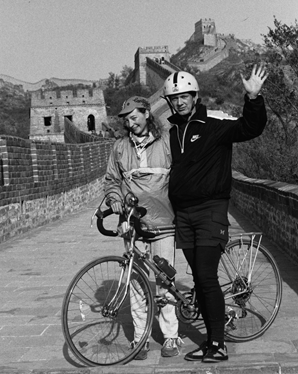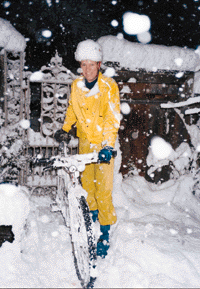Shifting Gears: An Attorney with an Attitude
By Charles Luce
Photographs courtesy of Mac Shelton
The reception area of Seattle's MacDonald, Hoague & Bayless law firm impresses visitors not so much with its opulence as its patina: fifteenth floor of an historic downtown office building. Lots of old marble and thick carpet. A tasteful glass sign democratically listing the firm's partners all in the same size type. Wouldn't surprise me if some of these guys' great-grandparents crossed the continent on the Oregon Trail, the West Coast version of coming over on the "Mayflower."

I'm standing there awash in law-office-low-key when the elevator door rumbles open. A bike messenger wearing black tights, a bright yellow windbreaker, and a swoopy helmet steps off, looking for all the world like a comic book super hero. In such a genteel setting, this guy is a jarring sight. He's lean, athletic, and displays no surly attitude, soul patch, or visible body piercing-not exactly a typical representative of his profession-but, then, I figure a big-time outfit like this hires a better class of bike messenger. He greets the receptionist by name and drops a pile of mail on her desk. Must be their regular man, I think.
He catches my eye and says, "Hi," real friendly like. I nod coolly, somewhat taken aback by the familiarity. I mean, he's a bike messenger, for crying out loud. Turning away, I inform the receptionist I've got a 10:30 with attorney Mac Shelton, which inspires a rash of snorts and a stifled laugh.
I don't get it. I check my fly. It's zipped. I check around the room. It's just me and Spiderman. Neither of us is doing anything particularly funny, as far as I can tell. "What?" I ask. The bike messenger speaks up again. "I'm Mac Shelton," he says, extending his hand.
Whoops. So much for appearances. I fumble for an apology, but Shelton will have none of it.
"Oh, it's happened before," he says, seguŽeing into a story, which, I soon will discover, is something he does a lot. "About seven years ago I was riding up in the elevator with [founding partner, now deceased] Fran Hoague, and I said good morning to him. I was dressed just like this. He didn't recognize me at first. A few seconds went by, and then it dawned on him. 'Mac?' he said. We got a good laugh out of that."
I'd heard about Shelton's kind demeanor, and his deft deflection of my faux pas was totally in character. But don't let the mild-mannered exterior fool you. David "Mac" (his middle name is McCullough) Shelton '66, who rides a bicycle four miles to work from his home in Seattle's Madrona neighborhood and back nearly every day, weather-be-damned, is indisputably the man to see in the Northwest if you are injured in a bike-related accident, especially if the accident involves brain trauma. In such a case, Shelton has been known to unleash a relentless intensity that leaves foes wondering what happened to Mr. Nice Guy.
Willfulness and Devotion
Terrier-like tenacity is in Shelton's blood. His father, David S. Shelton '37 was a promising young journalist when he was drafted into the U.S. Army in 1942. While an infantry commander during the horrific Battle of the Bulge, a sniper's bullet tore through the left side of the elder Shelton's brain. "My dad was totally paralyzed on his right side and had to start from scratch again at age 28," Shelton recalls. "He had been a highly verbal person, very bright, a very skilled writer. It took three years of intense rehab work just to get him to the point where he was able to articulate sentences and express himself."
Despite this handicap, Shelton says he couldn't have asked for a better role model. "He was intellectually and physically and emotionally inspiring to me throughout my growing-up years."
As a close-in witness of the day-to-day heroism of his father's existence and with additional guidance from his mother, Mary McCullough Shelton '36, who bred in him unflinching commitment and dogged determination, Shelton grew up with a deep drive to apply his talents for the good of others.
After graduating from the University of Washington School of Law in 1970, he landed a job at MacDonald, Hoague & Bayless, a respected firm with a reputation for taking on the causes of the downtrodden. He never left. These days he has about 30 clients at any given time. Roughly 50 percent of them are bicycle injury cases and 40 percent are other types of personal injury, including brain injury, medical malpractice, and product liability cases. The rest of his working hours he spends as a mediator with the Washington Arbitration and Mediation Service, a job he finds satisfying because he likes helping to resolve differences.
Strange Days
Shelton says Oberlin College nurtured many values like that, which, even now, are very important to him. He remembers the campus in the early '60s as a strange mix of a serious, even stoical, academic atmosphere juxtaposed with an exciting time of social and political change. While majoring in government, he began following in his father's journalistic footsteps by editing the Review and writing a series of editorials critical of Oberlin's administration and Board of Trustees. This drew the ire of then trustee chair Erwin Griswold, a Harvard Law School dean and former U.S. solicitor general, who publicly condemned him.
"Griswold felt that students had gotten out of hand in their protesting of various issues, whether international, national, or campus," Shelton recalls. "I was a very visible target since I was editor of the Review. I have a lasting memory of economics professor Robert Tufts standing up at a campus-wide meeting during the 1965 Commencement Weekend to vigorously and unapologetically defend me."
Shelton seemed to be headed toward a life in the fourth estate-he also interned at the Cleveland Plain Dealer and worked for the Oberlin News-Tribune while still a student-but admits to feeling another tug: "I had a bad case of Potomac fever. I really wanted to work on The Hill."
And so he moved to D.C. after graduation, eventually finding a job on Bill Proxmire's Joint Economics Committee as an assistant to a staff economist. "That experience," he declares flatly, "sated my political ambitions. Seeing what it cost in terms of people's lives made me realize it was not for me."

Cycling in a
Winter Wonderland
What "was" for him was a life grounded in good sense, both philosophically and physically.
"Physical activity maintains my sanity as a trial lawyer," says Shelton, who turned 54 in September. "After working a phone or taking depositions all day, it's great to get some fresh air and do something physical immediately." (He's also into kayaking, backpacking, and cross-country skiing.)
"Human-powered endeavors are one of the most worthy things you can do in terms of the feeling of control you have moving yourself around in the world and knowing all the time that you are strengthening your heart, strengthening your lungs. I love life. I hope every mile I put in on a bike is just that much more of an investment in a longer time on earth."
Shelton's 27-year-old son, David, who, not surprisingly, rides a bike to his job as a transportation planner, illustrates the good sense of his old man's commitment to self-locomotion with a yarn set during Seattle's Big Snow of December 1990. "The streets were clear when Dad rode his bike to work in the morning. But during the day it snowed about 12 inches, a monstrous dump for the mild shores of Puget Sound. By 3 o'clock one of his partners who lives in Madrona offered to drive him home. Dad declined, saying he'd be fine. And he was. He made it back in about 45 minutes-20 minutes longer than his normal commute." The partner, on the other hand, phoned four hours later to say he had just pulled into his driveway.
Doesn't this Guy
Ever Sweat?
No one will argue that cycling has its virtues. But a busy trial lawyer spinning his sprockets through daily life raises a few questions. Like, for one, doesn't this guy own a car?
Well, yes. In fact, Shelton and his wife, Frauke Rynd, own two: a Subaru station wagon and, Shelton's favorite, a four-wheel-drive Nissan pick-up. The four-cylinder, he points out quickly, not the gas-sucking six. And, for another, Shelton is around people all day. Hasn't his paralegal ever surreptitiously left a stick of Right Guard in his desk drawer?
"I ride slowly," he says, "but there's a shower in the building if I need it. I have an antique oak wardrobe in my office, and I keep all my wingtips, suits, ties, and button-down shirts in there. I lead a totally schizophrenic life. At home it's jeans and flannel shirts.
And couldn't The Fates do a little gear shifting of their own, transforming the advocate to victim? "You learn to deal with traffic effectively. You see a lot of bicyclists who are not smart bicyclists and a lot of bicyclists who are not lucky. Success takes a little bit of both, I think. I go down hills slower than I did 10 years ago. I almost always give myself six feet of distance between parked cars and my bike. And I deliberately choose routes that are less heavily traveled, that have fewer hazards."
Big Wheel
Keeps on Turnin'
Son David says his father is the most active person he's ever met at any age. Shelton has to be to keep up with the other interests he's got going. Family figures prominently. In addition to David, he has a 33-year-old daughter, Lynn, from a first marriage, and two stepchildren, Tanya and Rob. Then there's his volunteer work: advocating legislation to make wearing bike helmets mandatory in Washington state and promoting bike safety education programs; and sitting on two groups organized to help preserve the Methow Valley, east of Washingtons Cascade Range, where he and Rynd are putting the finishing touches on a new home.
Remarkably, he still manages to travel-he and Rynd co-led bike trips to China for many years-and read. Most recently on the bedside table was The Organic Machine, a social and natural history of the Columbia River by Richard White. Through it all, Shelton the natural-born storyteller admits the writing bug keeps biting, and he would love to find the time to pen a novel.
"The dream book for me would be one that involved a central character who had suffered a disabling injury and who finds himself with physically able partners on an adventure where they are faced with some adversity," he said. "This fellow, who had been considered a weak link in the group, turns out to have the character, the fortitude, the smarts to save everybody. In the process I would paint a picture of a beautiful wilderness area and the amazing characters you would run into along the way." Cool, Mac. But does your super hero get to wear black Spandex tights?
CHUCK LUCE writes about skiing, climbing, and cycling from Seattle. His work has appeared in Powder, Snow Country, Bike, and other magazines.